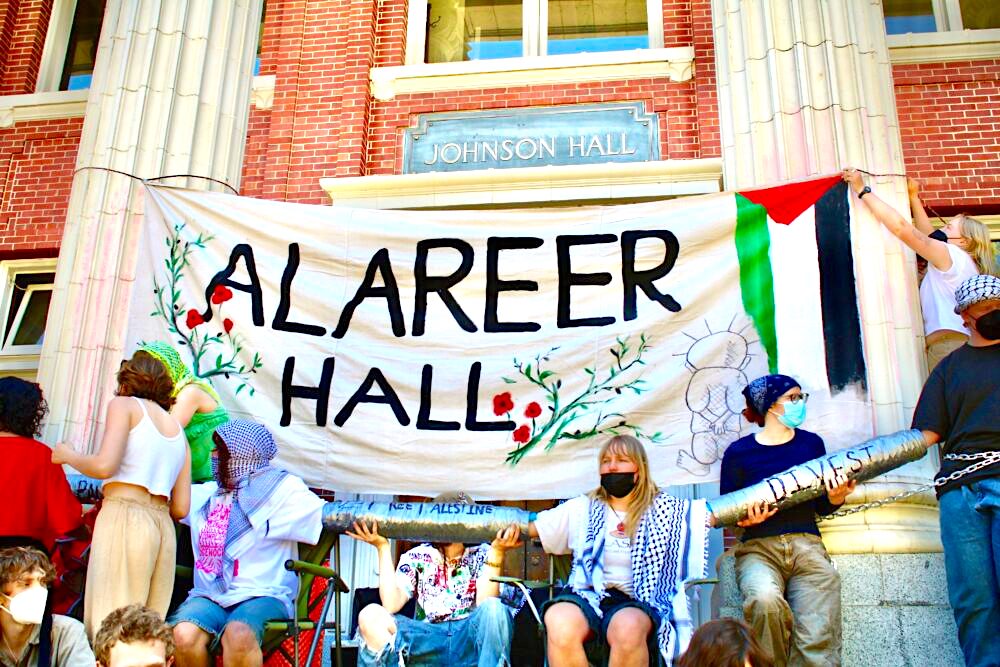People’s history is an urgent necessity for Palestine, where it is vital to communicate the empowered voices of the people to the rest of the world, writes Ramzy Baroud.

Protesters from the University of Oregon Gaza Solidarity Encampment renamed Johnson Hall, dubbing it Alareer Hall, in a May 2024 demonstration. (Ian M., Flickr, CC BY-SA 2.0)
 My journey into the realm of people’s history began during my teenage years when I first read Howard Zinn’s A People’s History of the United States.
My journey into the realm of people’s history began during my teenage years when I first read Howard Zinn’s A People’s History of the United States.
This initial exposure sparked my curiosity about how history is constructed and it led me to delve deeper into historiography — particularly the evolution of people’s history as an intellectual movement.
Over the years, a wide range of historians, from Michel Foucault and Marc Bloch to Lucien Febvre and Chris Harman, each offered unique perspectives on the study of ordinary people in history.
But it was Antonio Gramsci who presented a more universal, less provincial and Western-centric approach to history.
Although Gramsci did not explicitly position himself as a historian of the people, his ideas on organic intellectuals and cultural hegemony have provided invaluable tools for understanding how ordinary people can shape history. Gramsci’s theories have brought a more relatable and applicable understanding of Marxism, particularly by liberating it from the confines of rigid economic theories.
Linda Tuhiwai Smith’s Decolonizing Methodologies: Research and Indigenous Peoples further deepened my understanding of how to approach history from a decolonial perspective.
Smith’s methodology allows one to revisit and reconsider Palestinian history, challenging the orientalist and elitist perspectives that have long distorted the narrative.
It opens eyes to a lingering issue within indigenous history: indigenous historians who unknowingly replicate the very methodologies used by Western historians to portray them as the “other.”
Smith’s work fundamentally challenges the traditional view that history is written by the victor.
“It is the story of the powerful and how they became powerful, and then how they use their power to keep them in positions in which they can continue to dominate others,” she wrote.
Instead, history can be written to empower the oppressed, enabling them to challenge their victimhood. However, for this alternative history to be effective, it must be acknowledged not just by historians but also by those affected by the misreading of history.
Malcolm X’s Empowerment and Global Resonance
One of the most profound aspects of Malcolm X’s message, aside from his courage and intellectual rigor, was his focus on empowering Black communities to challenge their own inferiority and reclaim their power. He did not prioritize confronting white racism; rather, he sought to inspire Black people to assert their identity and strength.
This message has resonated globally, especially in the Global South, and continues to thrive today. For a deeper understanding of Malcolm X’s impact, one should read The Dead Arising: The Life of Malcolm X by Les Payne.
In the Palestinian context, there is a similarly pressing need for a reclamation of the narrative — a reclaiming of both identity and history. While a people’s history of Palestine is beginning to emerge, there are still misunderstandings about what this form of research truly entails.
The Role of Refaat Alareer in Palestinian History
Refaat Alareer, a Gaza-based Palestinian historian, will be remembered for his significant contributions to articulating the Palestinian struggle for freedom.
In the years leading up to his assassination by Israel during the Gaza genocide on Dec. 6, 2023, he consistently emphasized the centrality of resistance in Palestinian discourse, gaining recognition for his courage, poetry and intellectual work.
It is also essential to highlight Alareer’s unwavering belief that Palestinians must control what I refer to as “the means of content production.” This control is vital to prevent the Palestinian narrative from being hijacked or manipulated by external forces.
“Gaza writes back because the power of imagination is a creative way to construct a new reality. Gaza writes back because writing is a nationalist obligation, a duty to humanity, and a moral responsibility,” he wrote.
People’s History is Not Just Oral History
There are several common misunderstandings about people’s history that need to be addressed. These misconceptions often stem from the way this form of research is applied, especially in newer contexts.
While oral history and storytelling are essential components in laying the foundation for people’s history, they should not be confused with people’s history itself. Oral history can provide raw material for research, but true people’s history requires a broader, more comprehensive approach that avoids selectivity or bias.
The collective messages of ordinary people should shape the intellectual outcomes, allowing for a more accurate understanding of complex phenomena.
Concepts like sumud (steadfastness), karamah (dignity) and muqawama (resistance) must be seen not just as sentimental values, but as political units of analysis that traditional history often overlooks.
People’s History Can’t Be Used to Validate Pre-Existing Ideas
It is crucial to differentiate people’s history from opportunistic attempts to validate pre-existing ideas. Edward Said’s concept of the “Native Informant” highlights how seemingly indigenous voices have been used to legitimize colonial interventions.
Similarly, political groups or activists might selectively present voices from within oppressed communities to validate their own pre-existing views or agendas.
In the Palestinian context, this often manifests in the portrayal of “moderate” Palestinians as the acceptable face of the Palestinian discourse, while “radical” Palestinians are labeled as extremists. This selective representation not only misrepresents the Palestinian people but also allows Western powers to manipulate the Palestinian narrative without appearing to do so.
People’s History is Not the Annunciation of Pre-Existing Agendas
In traditional academic research, the study typically follows a hypothesis, methodology and a process of proving or disproving ideas. While people’s history can follow rational research methods, it does not adhere to the traditional structure of validating right or wrong.
It is not about proving a hypothesis, but about uncovering collective sentiments, thoughts and societal trends. The responsibility of the historian is to reveal the voices of the people without subjecting them to pre-established notions or biases.
People’s History is Not the Study of People
Linda Smith emphasizes the importance of liberating indigenous knowledge from the colonial tools of research. In traditional Western research, the colonized people are often reduced to mere subjects to be studied.
People’s history, on the other hand, recognizes these individuals as political agents whose histories, cultures and stories are forms of knowledge in themselves. When knowledge is harnessed for the benefit of the people it belongs to, the entire research process changes.
For example, Israel ‘studies’ Palestinian culture as a means to subdue Palestinian resistance. They attempt to manipulate societal fault lines to weaken the resolve of Palestinians.
This is a crude but effective manifestation of colonial research methods. While these methods may not always be violent, their ultimate goal remains the same: to weaken popular movements, exploit resources and suppress resistance.
People’s history is an urgent necessity, especially in contexts like Palestine, where it is vital to communicate the empowered voices of the people to the rest of the world.
This form of research must be conducted with a deeper understanding of its methodologies to avoid further marginalization and exploitation. By prioritizing the narrative of ordinary people, historical discourse can be shifted towards greater authenticity, justice and empowerment.
Dr. Ramzy Baroud is a widely published and translated author, an internationally syndicated columnist and editor of The Palestine Chronicle. His latest book is The Last Earth: A Palestinian Story (Pluto Press, 2018). He earned a Ph.D. in Palestine Studies from the University of Exeter (2015), and was a non-resident scholar at Orfalea Center for Global and International Studies, UCSB. Visit his website.
This article is from Z Network, is funded solely through the generosity of its readers.
Views expressed in this article and may or may not reflect those of Consortium News.

I found this very interesting. This, for example-“Concepts like sumud (steadfastness), karamah (dignity) and muqawama (resistance) must be seen not just as sentimental values, but as political units of analysis.” While I don’t know their importance “as political units of analysis” (?) I appreciate their inclusion as Concepts like sumud (steadfastness), karamah (dignity) and muqawama (resistance) must be seen not just as sentimental values, but as political units of analysis.(???) Such information yields a sense of the collective soul. And a feel for the quality of heart valued by the people. Never would “dignity” find a home descriptive of the nature of America or Americans.white Americans, in particular. Black Americans like Maya Angelou, Toni Morrison, MLK,Malcolm X and our indigenous first people’s nation – ones most vulnerable to marginalization and worse – seem to possess its unique and hard won vitality.